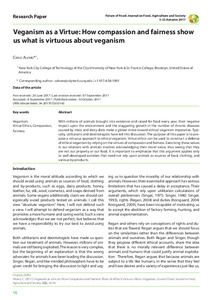Veganism as a Virtue: How compassion and fairness show us what is virtuous about veganism
| dc.date.accessioned | 2017-11-01T11:10:41Z | |
| dc.date.available | 2017-11-01T11:10:41Z | |
| dc.date.issued | 2017-10-16 | |
| dc.identifier.issn | 2197-411X | |
| dc.identifier.uri | urn:nbn:de:hebis:34-2017072653143 | |
| dc.identifier.uri | http://hdl.handle.net/123456789/2017072653143 | |
| dc.language.iso | eng | |
| dc.publisher | Department of Organic Food Quality and Food Culture at the University of Kassel, Germany and Federation of German Scientists (VDW) | eng |
| dc.rights | Urheberrechtlich geschützt | |
| dc.rights.uri | https://rightsstatements.org/page/InC/1.0/ | |
| dc.subject | Veganism | eng |
| dc.subject | Virtue Ethics | eng |
| dc.subject | Compassion | eng |
| dc.subject | Fairness | eng |
| dc.subject.ddc | 630 | |
| dc.title | Veganism as a Virtue: How compassion and fairness show us what is virtuous about veganism | eng |
| dc.type | Aufsatz | |
| dcterms.abstract | With millions of animals brought into existence and raised for food every year, their negative impact upon the environment and the staggering growth in the number of chronic diseases caused by meat and dairy diets make a global move toward ethical veganism imperative. Typically, utilitarians and deontologists have led this discussion. The purpose of this paper is to propose a virtuous approach to ethical veganism. Virtue ethics can be used to construct a defense of ethical veganism by relying on the virtues of compassion and fairness. Exercising these values in our relations with animals involves acknowledging their moral value, thus seeing that they are not our property or our food. It is important to emphasize that this argument applies only to well-developed societies that need not rely upon animals as sources of food, clothing, and various by-products. | eng |
| dcterms.accessRights | open access | |
| dcterms.bibliographicCitation | In: Future of Food: Journal on Food, Agriculture and Society. Witzenhausen : University of Kassel, Department of Organic Food Quality and Food Culture. - Vol. 5, No. 2 (2017), S. 16-26 | |
| dcterms.creator | Alvaro, Carlo |

